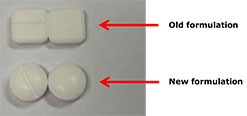Also see Glyceryl trinitrate tablets (Anginine and Lycinate): Alternative product and potential medicine shortage, 3 February 2017
Further to the information provided in the safety advisory, published 2 June 2016, testing by the TGA and the sponsor, Arrow Pharmaceuticals, has confirmed that the new formulation of glyceryl trinitrate (GTN) tablets for sublingual use are taking longer to disintegrate and is more difficult to break in half than the previous formulation.
GTN tablets are intended to dissolve within five minutes of placing under the tongue. However, the new formulation is taking longer than five minutes to disintegrate in laboratory testing. The lab results may not accurately reflect the time taken in the clinical setting, as reports received indicate that the disintegration is taking longer for some patients.
What happens next?
To address this issue, Arrow Pharmaceuticals is working to reformulate the product. However, this will take some time.
There are no GTN tablets registered for use in Australia other than Anginine and Lycinate. While it is anticipated that the affected tablets will be recalled, the TGA is first working with industry to arrange alternative supply. Having no available GTN tablets may pose a greater risk to patients than the potential problems associated with longer than expected disintegration time.
It has also been identified that the packaging for GTN tablets does not provide directions that the medicine is to be taken sublingually. This issue is also in the process of being corrected.
Information for consumers
In addition to the information provided in the safety advisory, if you or someone you provide care for uses Anginine or Lycinate GTN tablets, talk to your health professional. They may be able to recommend an alternative treatment, such as the spray-based formulation of GTN, Nitrolingual Pump Spray, which is unaffected by this issue.
If it is not possible or appropriate for you to use the spray and use of GTN tablets is continued, be aware that the tablets may not work within the expected timeframe and may be difficult to break in half.

Please note that it has been confirmed that the old formulation (square tablets) is not affected by this issue and can continue to be used as long as the tablets are within the expiry date and in keeping with the product's storage instructions (discard three months after opening the bottle).
As usual, GTN tablets should be taken as directed by your health professional, allowing them to dissolve under your tongue. GTN tablets must not be swallowed like normal tablets, as they will not work.
If GTN tablets do not relieve your symptoms, you should seek urgent medical attention (calling 000 if necessary).
Further information regarding this issue, including details about arrangement of an alternative supply of GTN tablets and a recall of affected products, will be published as soon as it becomes available.
Information for health professionals
In addition to the information provided in the safety advisory, please be aware of the updated information regarding this issue.
The sponsor will be writing to pharmacists and doctors, requesting that pharmacists add a sticker to GTN tablet bottles saying 'do not swallow' and that pharmacists and doctors remind patients that the tablets are for sublingual use.
If clinically appropriate, the TGA recommends you consider switching patients who use GTN tablets to the GTN spray, Nitrolingual Pump Spray, noting that the spray delivers a different dose (400 micrograms) to the tablets (600 micrograms).
If your patients continue to use GTN tablets, advise them to be aware that the tablets may not work within the expected timeframe and may be difficult to break in half.
Advise patients to seek urgent medical attention (calling 000 if necessary) if GTN tablets do not relieve their symptoms.
Further information regarding this issue, including details about arrangement of an alternative supply of GTN tablets and a recall of affected products, will be published as soon as it becomes available.
Reporting problems
Consumers and health professionals are encouraged to report problems with medicines or vaccines. Your report will contribute to the TGA's monitoring of these products.
The TGA cannot give advice about an individual's medical condition. You are strongly encouraged to talk with a health professional if you are concerned about a possible adverse event associated with a medicine or vaccine.

